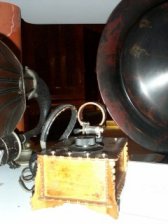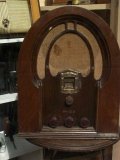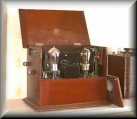'How sound is radio drama research?', address,
Fifth Radio Drama Conference, 9 February 2002 - Alan Beck
[The full version of this was put online before the conference, for discussion. Some later notes have been added.]
SECTION 1: INTRODUCTION - 'Radio Drama Research - progress and change'
KEY TERMS: Radio drama research, anniversaries, relationship with the stage, culturalism, re-invention of radio studies for the digital age, 'hard' radio studies and 'soft' radio studies, 'The Wheel of Fortune', interactive radio drama, broadcast 2 x two nights around 19 September 2000, new wave of radio drama - digital post-modernist
RADIO DRAMA CONFERENCES
First Radio Drama Conference - organised in Durham University by Peter Lewis (Peter Lewis without the 'M'), resulting in (1) Lewis, Peter, ed., 1977, Papers of the Durham Radio Literature Conference, Durham: Durham University Printing Unit. Reissued as one volume, 1979, (2) Drakakis, John, ed., 1981, British Radio Drama, Cambridge: Cambridge University Press, and (3) Lewis, Peter, ed., 1981, Radio Drama, London: Longman. Ian Rodger was also an organsier - (4) Rodger, Ian, 1982, Radio Drama, London: Macmillan.
Second Radio Drama Conference - 1999 - Goldsmiths College, organised by Tim Crook and Alan Beck
Third Radio Drama Conference - 2000 - Goldsmiths College, organised by Tim Crook and Alan Beck
Fourth Radio Drama Conference - 'History of Radio Drama 1922-1970', 13 January 2001, sponsored by the BBC, in BBC Broadcasting House, Studio 6A
Fifth Radio Drama Conference - 9 February 2002 - Goldsmiths College, organised by Tim Crook and Alan Beck (See below for details of papers, practical demonstration, and interview with practitioner.)
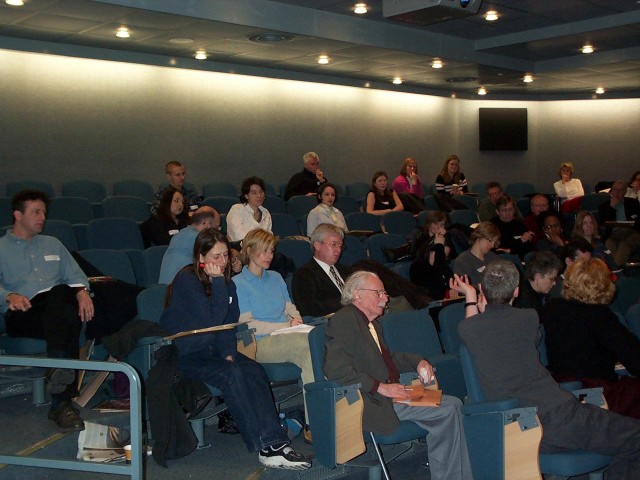
Fourth Radio Drama Conference - 9 February 2002
1.1 Anniversaries
'Radio Drama 2002' marks a significant quarter century of academic work on radio drama in the UK. Due bouquets go to earlier practitioners and dramaturges, especially in the B.B.C., and such as Val Gielgud (1900-1981), Donald McWhinnie, Martin Esslin (Head of BBC Radio Drama 1963-77) and Ian Rodger (e.g., Gielgud 1957; McWhinnie 1959; Esslin, 1964, 1971; Rodger 1982).
It is now twenty-five years since the first conference on radio drama, organised in Durham University by Peter Lewis - that is the Peter Lewis without the 'M' (Lewis 1977). Then there was the splendid trio of publications which founded our academic studies in the UK - the collection of essays, British Radio Drama, edited by John Drakakis (Drakakis 1981), ditto Radio Drama by Peter Lewis (Lewis 1981) and the monumental Understanding Radio by Andrew Crisell (Crisell 1986 and 1994). I have elsewhere paid tribute (e.g., Beck, 2001b, 2.2) to outstanding works by Elissa Guralnick (Guralnick 1996), Frances Gray (Gray 1981 and 2000), Martin Shingler (Shingler and Wieringa 1998), Steve Garner (Garner 1999) and Tim Crook (Crook 1999), among others.
Radio Drama 2002 is the fourth Radio Drama Conference, established by a willing team, and co-organised by Tim Crook and myself. Last year ('History of Radio Drama 1922-1970', 13 January 2001), we were kindly hosted by the B.B.C.
March 2002 marks the seventieth anniversary of the opening of B.B.C. Broadcasting House (March 1932), while in November is the eightieth birthday of the B.B.C. (14 November 1922 - 14 November 2002). (See Beck, 2001b, Introduction on the B.B.C. and anniversaries.)
1.2 Radio drama research - Soundhouse - radio drama in the digital age
More radio drama research is needed. Scholars must re-engage in the pioneering dialogue that resulted in Drakakis 1981 and Lewis 1981, especially as radio drama is fully in the digital age. That is, fully as a dialogue between scholars themselves, and practitioners and scholars. The overall enterprise, Radio Drama Soundhouse, includes:
1. Academic contributions
2. Interviews and dialogue with practitioners - fully exploring
the techniques and creativity of radio drama directors, playwrights,
actors, and technicians. A dramaturgical (participant-observer)
exploration of the B.B.C. Radio Drama Department, independent
production companies, and regional production, and of soaps.
3. Practice-as-research.
4. Accounts of teaching radio drama - exchanging best practice.
5. Copyright and play extracts (production and scripts). Since
there is no solution to putting illustrative extracts from B.B.C.
plays onto the Web, we could - after copyright clearance - come
up with our own productions of extracts, with our own resources.
This would respond to the urgent need to afford play extracts
and to illustrate radio drama history.
6. Radio drama history, including interviews with those surviving
practitioners who have worked in earlier decades.
NOTE IN 2009 - The most recent contributions to radio drama scholarship are Huwiler, Elke, 2005, 'Storytelling by sound: a theoretical frame for radio drama analysis', The Radio Journal, Vol 3, number 1, and Stanton, William, 2004, 'The invisible theatre of radio drama', Critical Quarterly, Volume 46 Issue 4, 94-107.
In the moves to apply an academic discipline to the study of radio drama in the UK, there have been some conspicuous gaps. Only a handful of drama departments teach radio drama (2002 position). UK drama studies have not made, I previously argued, enough of a contribution. This specialisation is challenging. It requires both a working knowledge of BBC Radio Drama Department production methods and a radio drama production suite (Beck, 2001b, 2.1). The initial impetus to 'discipline' radio drama came from English Departments (Lewis 1977). Another problem is that in studying radio, academics are scattered. They are not in the same playing field. They suffer from that false division of labour between humanities and the social sciences (Beck, 2001b, 2.1). But radio drama has special needs.
NOTE IN 2009 - There only remains one radio drama course in the UK, I believe. No UK academic now publishes actively on the subject, as far as I can discover. This seems a collapse of interest in the UK. There may be no parallel to this abandonment of a significant subject in humanities or media studies? However, Crisell, Andrew ed., 2009, Radio: Critical Concepts in Media and Cultural Studies, 3 vols, Routledge, with its reprints, could give more impetus to radio drama studies. I retired mid-2005. I attempt to encourage radio drama teaching, production and research via my Radio Hub at http://www.savoyhill.co.uk/.
1.3 Radio drama's relationship with the stage
My study of radio drama in the 1920s (Beck, 2001, 'The Invisible Play' - B.B.C. Radio Drama 1922-1928) emphasised how close was the relationship with the stage. The 'curtain warmers', 15 minute to thirty minute one act plays, then so popular, were the predominant fare of those early years and when so little original radio drama was broadcast. Wireless drama was weaned on the stage.
So much of new British writing depends still on the primacy of the dialogue. Joe Penhall's 'Blue-Orange', a great success on the London stage, was recently adapted for Radio 3 (6 January 2002). It is a tense stand-off in a psychiatric hospital, and mainly verbal. Spectacle has also been reduced on the Shakespearean stage (Davies, 1988, 1), and there is also the influence of the new Globe.
By contrast, the German-speaking stage in the last years has continued a big-cast and physical type of theatre. Here are a couple of examples to point the contrast with the UK radio drama-stage symbiosis. I have much benefited from seeing these productions.
'Heute ist eine schone Tag' (Today is a Beautiful Day), a play
about social death by Gritt Uldall-Jessen, was performed by LOT-Theaters
(Braunschweig) in the Stuttgart Festival 1999. The audience viewed
the characters 'living' the life of the unemployed in aesthetic
alienation, through six windows. Overheard was an overwhelming
and angry monologue, wildly underscored by film-type music.
'Sports-Stück' (Sports Play), Vienna 1999, had an ensemble of 50 and displayed Laban-type movement and monologues about the fascism of sport.
Production, directing and acting styles, and budgets, are so much more constrained in the UK.
1.4 Culturalism
NOTE IN 2009 - I fully explored these issues below in Beck, 2002, Section 8.
I have also written - firmly perhaps but honestly - about how text-based radio drama is over-shadowed by media studies methodologies. For me, there can be a sort of reductionist culturalism abiding in media studies (Beck, 2001b, 2.4 and Beck, 2002, Section 8). Culturalism (in Noël Carroll's and David Bordwell's terminology) is a seeking out of differences - ideological, institutional, and those related to gender and ethnic issues.
But Christine Gledhill has now warned, in film, of 'political stagnation of a grand theory based on ideological and subjective interpellation' (Gledhill and Williams, 2000, 3). Also of 'postmodernism's apparent loss of grip on cultural politics' (ib). Martin Barker warned about reception studies in films:
... curiously, they end up having little to say about the films themselves
(Barker, 2000, 189)
For more on culturalism see Radio theory - what is it for? What is it?
The danger is that radio drama research dwindles in UK drama departments and humanities departments. And that media studies imposes too narrow an agenda or corset. The following points are pessimistic and to be taken as merely the 'via negativa' of possible future radio drama research within media studies and sound studies:
(1) A narrowness that has been condemned as 'cultural journalism' (Branston, 2000, 24)
(2) An agenda confined to the three PCs of race, gender and sexuality
(3) A refusal to engage with radio plays and aesthetics, and, centrally, the texts of radio plays
(4) Reception studies that do not extend to the listeners' feelings and thoughts, and moral judgements, and the micro-ethics of any individual play
1.5 Re-invention of radio studies for the digital age, 'hard' radio studies and 'soft' radio studies
Significantly, Christine Gledhill's recent contribution has been in a book entitled Reinventing Film Studies. I have argued in my electronic book, The Death of Radio? An essay in radio philosophy for the digital age, for a re-invention of radio studies for the digital age.
I have divided the area into 'hard' radio studies (continuing the successful work of media studies departments) and a new 'soft' radio studies (widened interdisciplinary work on cognitive studies, apparatus theory and phenomenology; aesthetics, fantasy, desire, the body, biology, image theory, performance theory; radio-philosophy; cross-overs to theorising the film sound track & sound installations & sound in live performance) (Beck, 2002, Introduction 10-11).
In radio drama studies overall, the text comes first. Text should be central to 'hard' radio studies and 'soft' radio studies. I have heard media studies radio academics discuss privately how to include text-based analysis in their courses and research. And they have not, sometimes, come up with solutions that I would regard as satisfactory. This issue can emerge, to take a specific problem area, as a hope to engage with Scannell's masterly and pioneering Broadcast Talk (Scannell 1991). Applying discourse analysis to all the domains of radio is a huge and specialised enterprise, especially as the relevant research areas (discourse analysis, sociolinguistics, pragmatics, semantics, functional text analysis, register, genre, cohesion, politeness, intimacy, consciousness studies, neurocognitive mechanisms etc.) are booming. See, as examplar, Kress, Gunther, 'The organization of talk on talk radio' in Crissell, 2009.
I was the first to apply the methods of discourse analysis
to radio drama (and among the pioneers of this for radio studies)
- 'Radio Drama "Playspeak",
Speech and Drama, 34 (No 2) 15-20
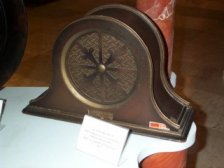
1.6 'The Wheel of Fortune', interactive radio drama, broadcast 2 x two nights 19-20 September 2001
BBC Radios 3 and 4 simultaneously broadcast two different but related plays with a third available on the BBC's website - all called 'The Wheel of Fortune'
The key word or even the scare word of the digital age is 'convergence' - meaning that previously separate communications systems, such as the Internet, radio, television and the telephone will come together. (See Beck, 2002, 1.13-14 for radio.) We will listen to (and view) interactive radio drama on the computer. On 6 February 2002, we were invited to chat online with two characters from 'The Archers' B.B.C. Radio 4 soap (presently in a sensationally adulterous liaison). Indeed the same night, a television soap had a similar online invitation.
More importantly, the interactive 'The Wheel of Fortune' was broadcast simultaneously on B.B.C. Radio 3 and Radio 4, and on the Internet (2 x two nights 19-20 September 2001, 11.30 pm to midnight). Listeners were invited to switch from one to another and the third medium at the twenty-two cross-over points - when the command 'Bet Now!' was heard. The web site offered '90 million ways to listen - it's your choice'.
Is this the future of radio drama? This was a bold play, under the sure and highly skilled hands of director Marion Nancarrow and also playwright Nick Fisher. 'The Wheel of Fortune' - taking us into a possible future of radio drama - necessitated a higher-than-average budget. Production took six days (two on location and four in the studio). Note that thirty minutes product would otherwise be confined to one day's studio production. The post-production was relatively expensive and of time (months), partly in getting the cross-over points matched up. Every segment had to match to a tenth of a second.
I enjoyed playing with 'The Wheel of Fortune' listening experience, and testing out what we academics call the 'active audience thesis'. Again, the writing assured me and there were strong powers of observation there, about the casino experience. I had a couple of tiny doubts. The project could have brought the listeners closer to interactive computer games. A dash more comedy in this intensity would have helped - I felt a tad excluded. But 'The Wheel of Fortune' twinned up an amazing formalist experience with strong plot engineering and production.
So will other radio plays be 'convergent' with the B.B.C.'s tri-media policy and encourage licence-payers to hit on the B.B.C. web sites? 'The Wheel of Fortune' was a prestige project. Its like may not come again too soon.
See http://www.eastgate.com/HypertextNow/archives/Fisher.html for an interview with Nick Fisher.
Also on the BBC web site http://news.bbc.co.uk/1/hi/entertainment/tv_and_radio/1552369.stm
See also 'The Dark House', BBC Radio 4 http://www.bbc.co.uk/radio4/arts/darkhouse/
1.7 New wave of radio drama - digital post-modernist
Some digital production, but crucially the aesthetic responses of directors, technicians, playwrights and actors, mark a new age - categorically a new wave. This is not just the post-stereo age of radio drama, but the emergence - in some productions - of the digital post-modernist. I have termed some of these plays 'filmic' radio drama and also 'director's theatre' in radio drama - auteurist radio drama by the director (Beck, 2001b, 3.6). It is only in this new digital age that auteurist radio drama has and can emerge fully.
Obviously most of radio drama continues successfully as what I term 'standard production' - based on some long-standing conventions and using fewer of radio's features (see Glossary).
Digital technology brings much more control and speed to radio drama, more multi-layering of sound, and accuracy in 'placing' a sound event in the overall plan. Overall, it offers a new 'vision' of the play 'score' (to borrow a term from Stanislavski) in onscreen editing and for the auteur. (See Beck, 2002, 5.3).
1.8
At the same time, listening in the media can rapidly shift. I regarded last summer's 'Big Brother 2001' as a sort of radio drama ((Beck 2001a). Each 'character' was individually miked, and there was both a roughness and a freshness to the location recording. Also, the mechanisms of sound collection and production were constantly foregrounded for us television viewers.
I have used sequences from 'Big Brother' in my teaching of radio drama. These - carefully selected - are almost fully-formed radio drama scenes - especially if what's happening is 'games people play', verbal routines and ritualised mockery. The 'scenes' have been edited anyway before transmission (not on the continuous live coverage.)
In terms of representing the Lifeworld, and playing with the possibility for the while that the 'Big Brother' scenes are 'radio drama', they are what I would term 'hyper-realism' in radio drama. So this brings me to some three categories of realism offered in the digital age. (See Realism or naturalism - SLICE-OF-LIFE - VERISIMILITUDE - ('like-to-reality-truth') - 'window on the world')
Standard production offers soft realism. 'The Wheel of Fortune' is 'hard realism' - with more of the 'mise en scène' created in the sound picture (Beck, 2000a, 'Mise en scène' and see 'mise-en-scène' - representation of the play scene, locations, spaces and perspectives ). My monograph on 'Cognitive mapping in radio drama' has explored my introduction of 'mise-en-scène' into radio drama studies.
1.9
'Hotel Europa' (John Dryden, 2000, B.B.C. R4, Friday play), is my last category of realism - hyper-realism. Digital production has allowed the emergence of this, along with (though not necessarily only with) on location recording.
This was the B.B.C. entry into the Prix Europa. For me, this is the culmination so far of the possibilities of hyper-realism.
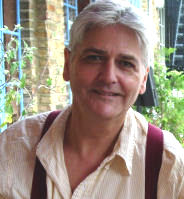
Alan Beck
Beck, Alan, 1985, 'Radio Drama "Playspeak", Speech and Drama, 34 (No 2) 15-20
at http://www.savoyhill.co.uk/playspeak/playspeak1.html
Beck, Alan, 1997a, Radio Acting, London: A & C Black. ISBN 0-7136-4631-4. Available on Amazon. CLICK HERE.
Beck, Alan, 1997b, 'Fictional soundscapes', World Forum for Acoustic Ecology (WFAE) at http://interact.uoregon.edu/mediaLit/wfae/library/articles/beck_list_radioplays.pdf
Beck, Alan, 1998, 'Point-of-listening in radio drama', Sound Journal, electronic publication (Now available on this Alan Beck site. Sound Journal has been deleted from its original site.)
at http://www.savoyhill.co.uk/pointoflistening/pointoflistening.htm
[Beck, Alan, 1999a, Radio Theory Site, including Glossary, electronic publication, http://speke.ukc.ac.uk/sais/RSN/index.html (No longer available. It has been deleted from the original site.)]
Beck, Alan, 1999b, 'Is radio blind or invisible? A call for a wider debate on listening-in', World Forum for Acoustic Ecology (WFAE),
at
also at - http://interact.uoregon.edu/MediaLit/WFAE/library/articles/beck_blindness.pdf
Beck, Alan, 1999c, 'Danger' talk for German Radio November 1999
at http://www.savoyhill.co.uk/danger/danger.html
Beck, Alan, 2000, Cognitive Mapping and Radio Drama by Alan Beck - Consciousness, Literature and the Arts, Volume 1 Number 2, July 2000 - monograph
at http://www.savoyhill.co.uk/cognitive/index.html
also at http://blackboard.lincoln.ac.uk/bbcswebdav/users/dmeyerdinkgrafe/archive/cog.html
Beck, Alan, 2001a, 'The Invisible Play' - B.B.C. Radio Drama 1922-1928 - online book published by Sound Journal
at http://www.savoyhill.co.uk/invisibleplay/index.html
Beck, Alan, 2001b, 'Playing By Ear: new ways of teaching and researching radio drama, Studies in Theatre Production
at http://www.savoyhill.co.uk/playingbyear/index.html
Beck, Alan, 2002, The Death of Radio? An Essay in Radio Philosophy for the Digital Age. Online book. Published by Sound Journal
at http://www.savoyhill.co.uk/deathofradio/
Beck, Alan, 2004, 'You've Got to Hide Your Love away: Gay Radio, Past and Present', chapter 8 in Crisell, Andrew, ed., More Than A Music Box. Radio Cultures and Communities in a Multi-Media World, 2004, Oxford: Berghahn Books. Reprinted in Crisell, Andrew ed., 2009, Radio : Critical Concepts in Media and Cultural Studies, 3 vols, Routledge. - CLICK HERE FOR EXCERPTS
Beck, Alan, 2005, The unspeakable act: 'performing' AIDS deaths - monograph for AIDS CULTURES
at http://www.savoyhill.co.uk/unspeakable/unspeakable.html
Beck, Alan, Radio Drama - directing, acting, technical, learning & teaching, researching, styles, genres (ONGOING PROJECT - started in 2005)
at http://www.savoyhill.co.uk/technique/
Beck, Alan, Radio Soap (serial drama) - HOW TO - advice by Alan Beck - production, scripting, post-production, marketing, web site, 'logging' (ONGOING PROJECT - started in 2005)
at http://www.savoyhill.co.uk/soap/
Beck, Alan, Background atmos sound files - freely available (ONGOING PROJECT - started in 2005)
at http://www.savoyhill.co.uk/technique/soundfilesintro.html
Beck, Alan, So you want to be an actor? FIRST STEPS TO PROFESSIONAL ACTING TRAINING. (ONGOING PROJECT - started in 2005)
at http://www.savoyhill.co.uk/actor/
To Alan Beck's Radio Hub at http://www.savoyhill.co.uk/
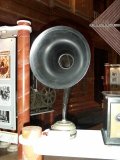
References
Barker, Martin, 2000, From Antz to Titanic. Reinventing Film Analysis, London: Pluto Press
Branston, Gill, 2000, 'Why theory', in Gledhill, Christine and Williams, Linda, eds., Reinventing Film Studies, London: Arnold, chapter 2
Cazeaux, Clive, 'Phenomenology and radio drama', British Journal of Aesthetics, 2005, 45, 57-74
Crisell, Andrew, 1994, 2nd ed., Understanding Radio, New York and London: Routledge
Crisell, Andrew, Radio Journal: International Studies in Broadcast & Audio Media; 2003, Vol. 1 Issue 1, p78, review, Theatre of Sound: Radio and the Dramatic Imagination, author Dermot Rattigan
Crisell, Andrew ed., 2009, Radio : Critical Concepts in Media and Cultural Studies, 3 vols, Routledge
Crook, Tim, 1999, Radio Drama: Theory and Practice, London: Routledge
Davies, Anthony, 1988, Filming Shakespeare's Plays. The Adaptations of Laurence Olivier, Orson Welles, Peter Brook and Akira Kurosawa, Cambridge: Cambridge University Press
Drakakis, John, ed., 1981, British Radio Drama, Cambridge: Cambridge University Press
Esslin, Martin, 1964, The National Theatre of the Air, BBC Lunch-time lectures, Second Series 4. London: B.B.C. Publications
Esslin, Martin, 1971, 'The mind as stage', Theatre Quarterly, 1 (3), 5-11
Garner, Ken, 1999, 'Putting the drama into dramatisation: in search of the source of current British Radio Drama', Sound Journal
Gledhill, Christine and Williams, Linda, eds., 2000, Reinventing Film Studies, London: Arnold
Gielgud, Val, 1957, British Radio Drama 1922-1956. London: Harrap
Gough, Lucy, 2000, Crossing the Bar, Head, Our Lady of Shadows, Bridgend, Wales: Seren, Poetry Wales Press Ltd., Wyndham Street, Bridgend, Wales
Gray, Frances, 1981, 'The nature of radio drama', chapter 4 in Lewis, Peter, ed., 1981, Radio Drama, London: Longman
Gray, Frances, 2000, 'Carry On, Echo: The Dissident Sound Body', Sound Journal
Hill, Mary Louise, Review. Theatre of Sound: Radio and the Dramatic Imagination, author Dermot Rattigan, Theatre Journal, Volume 56, Number 2, May 2004
Huwiler, Elke, 2005, 'Storytelling by sound: a theoretical frame for radio drama analysis', The Radio Journal, Vol 3, number 1
Huwiler, Elke bibliography at http://home.medewerker.uva.nl/e.huwiler/page3.html
Hutchby, I. 'The Communicative Affordances of Technological Artefacts',
in Conversation and Technologie from the Telephone to the Internet,
Polity Press, 2001, 13-33
Kress, Gunther, 'The organization of talk on talk radio' in Crissell, 2009
NOTE: Peter Lewis without an 'M' (Lewis 1977, 1981) is different from Peter M. Lewis (Lewis 1989, 1991, 2004)
Lewis, Peter, ed., 1977, Papers of the Durham Radio Literature Conference, Durham: Durham University Printing Unit. Reissued as one volume, 1979.
Lewis, Peter, ed., 1981, Radio Drama, London: Longman
Lewis, Peter, 1981a, 'Radio drama and English literature', chapter 10 in Lewis, 1981
Lewis, Peter M. and Booth, J., 1989, The Invisible Medium. Public, Commercial and Community Radio, London: MacMillan
Lewis, Peter M., 1991, 'Referable words in radio drama', chapter 2 in Scannell, Paddy, ed., 1991, Broadcast Talk, Sage
Lewis, Peter, 2004, 'Opening and closing doors: radio drama in the BBC', Radio Journal, (3) 161-176
McWhinnie, Donald, 1959, The Art of Radio, London: Faber and Faber
Priestman, Chris, 'Narrowcasting and the dream of radio's great global conversation', The Radio Journal, 2004, Vol 2, Issue 2, 77-88
Rattigan, Dermot, Theatre of Sound: Radio and the Dramatic Imagination, Carysfort Press, 2000 ISBN: 0-9534-2572-4
Rodger, Ian, 1982, Radio Drama, London: Macmillan
Scannell, Paddy, ed., 1991, Broadcast Talk, Sage
Shingler, M. & Wieringa, C., 1998, On Air. Methods and Meanings of Radio, London: Arnold
Sieveking, L., 1934, The Stuff of Radio. London: Cassell and Co
Stanton, William, 2004, 'The invisible theatre of radio drama', Critical Quarterly, Volume 46 Issue 4, 94 - 107
See also Radio Drama Reading List
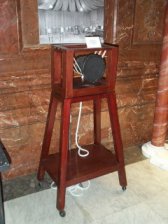
Glossary
Standard production (term coined by AB): Convention-bound radio drama directing style with limited use of radio's features. It successfully enables budget-controlled studio production: linear continuity of plot, dialogue- and protagonist-dominated, dialogue mostly in positions two and three, and strictly foregrounded above SFXs. Overall, a much plainer style - neutral acoustic or near-neutral (living-room) is common. See Standard production (predominant style in realist radio plays)
